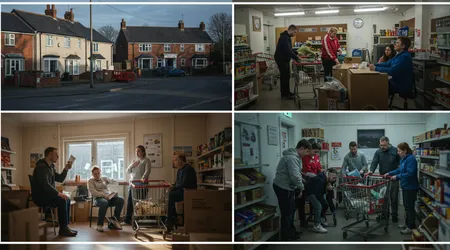Social Benefits Reform in the UK: Impact on Cost of Living

Social benefits in the UK have undergone significant reforms in 2025, aiming to ease the relentless pressure of rising living costs.
With inflation fluctuating and economic uncertainty looming, these changes are a lifeline for millions.
From Universal Credit adjustments to expanded childcare, the government seeks to balance support with fiscal responsibility.
But do these reforms truly shield vulnerable households from the cost-of-living storm?
This article dives into the heart of these changes, exploring their practical impact on everyday lives, dissecting their strengths, and questioning their gaps.
Let’s unpack how these policies reshape the financial landscape for UK residents.
Universal Credit: A Step Forward or a Half-Measure?
Adjustments to Universal Credit in 2025 have sparked both hope and skepticism among claimants. The government capped deductions at 15% of the standard allowance, down from 25%.
This change, effective April 2025, means over one million households keep an average of £420 more annually.
For someone like Sarah, a single mother in Birmingham, this extra cash could cover a month’s groceries. Yet, critics argue it’s a bandage on a deeper wound.
Despite the reduction, deductions still erode social benefits for those already stretched thin.
The Joseph Rowntree Foundation notes that 21% of UK residents 14.3 million people lived in poverty in 2022/23.
With inflation projected to hit 3.5% by December 2025, the real value of benefits risks shrinking.
++ Cultural Events Bring Life to the UK in May
Sarah’s £420 gain might vanish in rising utility bills. Is this reform bold enough to tackle systemic poverty?
The policy assumes claimants can stretch limited funds further, but reality paints a different picture. Food banks report surging demand, with some families rationing meals.
While the deduction cap offers breathing room, it doesn’t address stagnant wages or soaring rents. For many, it’s a welcome tweak but not a game-changer in the cost-of-living fight.

Childcare Expansion: A Game-Changer for Working Parents?
Free childcare expansion is a cornerstone of 2025’s social benefits reforms, promising 30 hours weekly for all under-fives by September.
Currently, parents of three- and four-year-olds access this, saving thousands annually.
For a dual-income family in Leeds, this could mean £6,000 more in their pocket yearly. But implementation hiccups raise eyebrows.
Also read: Universal Credit Change: Over One Million Households to Keep More Benefits
Nurseries face staffing shortages, and some lack capacity to meet demand. In rural areas, access remains patchy, leaving parents like Tom, a mechanic in Cornwall, driving miles for childcare.
The policy’s ambition is clear, but without infrastructure, it risks being an empty promise. Can the government deliver before parents lose faith?
Moreover, childcare costs aren’t the only hurdle. Transport, uniforms, and after-school clubs still strain budgets.
While the reform eases one burden, it doesn’t erase the broader cost-of-living squeeze. Families celebrate the savings, but they’re still juggling bills with no room for error.
Economic Context: Inflation and Poverty’s Persistent Grip
The backdrop to social benefits reforms is a volatile economy, with inflation at 2.2% in March 2025 but expected to climb.
Tariffs introduced in 2025 could push prices higher, eroding purchasing power. For pensioners reliant on social benefits, a projected 2.4% Social Security COLA in 2026 offers little relief. The cost-of-living crisis persists.
Poverty’s scale is staggering. The Trussell Trust reported 9.3 million people faced hunger and hardship in 2022/23, including 3 million children.
Read more: The UK’s Best Charities That Provide Financial Assistance
These numbers expose a harsh truth: social benefits alone can’t dismantle structural inequality. Reforms must go beyond tweaking payments to address housing and job insecurity.
Imagine a boat taking on water social benefits reforms are like bailing out buckets, but the hull’s holes remain.
Without tackling root causes like low wages, the vessel keeps sinking. Households need systemic change, not just temporary patches, to stay afloat in 2025’s economic waves.
Reform’s Political Ripple Effects
Politically, social benefits reforms are a tightrope walk. Reform UK’s recent electoral gains 10 councils and two mayoral races signal voter frustration with mainstream parties.
Their anti-immigrant rhetoric taps into discontent over strained public services, including welfare. Labour’s response, tightening asylum rules, risks alienating progressive voters.
Voters like Jane, a nurse in Manchester, feel caught in the crossfire. She supports welfare but resents perceptions of misuse.
Reforms must rebuild trust by ensuring fairness without punitive cuts. Otherwise, populist parties will exploit the gap, framing social benefits as a burden rather than a safety net.
The government’s challenge is to communicate that welfare strengthens society, not divides it. Transparent allocation and targeted support could counter Reform UK’s narrative.
But if reforms falter, political volatility will grow, leaving vulnerable claimants as collateral damage.
Practical Impacts: Stories from the Ground
Real-world stories reveal the human side of social benefits reforms. Take Ahmed, a delivery driver in London, whose Universal Credit deductions dropped in April.
The extra £35 monthly lets him buy fresh produce, not just canned goods. Yet, his rent hike outpaces this gain, keeping stability out of reach.
Contrast this with Lisa, a teacher in Newcastle, who benefits from childcare expansion. She now works full-time, boosting her income by £8,000 yearly.
But nursery waiting lists delayed her start, highlighting uneven rollouts. These examples show reforms’ potential and their limits in easing cost-of-living woes.
The gap between policy and reality is stark. While Ahmed and Lisa see benefits, others face delays or exclusions.
Reforms must prioritize accessibility and speed to ensure no one slips through the cracks in a crisis.

Data Snapshot: Social Benefits in Numbers
Understanding the scope of social benefits reforms requires hard numbers.
Below is a snapshot of key changes and their reach in 2025, drawn from government and independent sources.
| Reform | Impact | Reach |
|---|---|---|
| Universal Credit Deduction Cap | £420 annual gain per household | 1 million+ households |
| Childcare Expansion | 30 hours free for under-fives | Est. 500,000 families by Sep 2025 |
| Poverty Rate (2022/23) | 21% of UK population | 14.3 million people |
This table underscores the scale of need and reform. The 14.3 million in poverty highlight why social benefits must be robust yet precise.
Looking Ahead: Can Reforms Keep Pace?
As 2025 unfolds, the success of social benefits reforms hinges on execution. Inflation’s rise could erode gains, leaving claimants like Sarah and Ahmed vulnerable.
The government must monitor economic shifts and adjust support swiftly. Can they act before hardship deepens?
Long-term, social benefits need to tackle root issues housing, wages, and education.
Childcare expansion is a start, but without affordable homes, families remain trapped. A holistic approach could break the cycle, offering hope beyond survival.
Public trust is the final piece. Clear communication about who benefits and why can counter divisive narratives.
If reforms deliver tangible relief, they could redefine social benefits as a tool for unity, not division, in a fractured UK.
Conclusion: A Balancing Act for a Nation in Need
The 2025 social benefits reforms are a bold attempt to soften the cost-of-living blow for millions.
Universal Credit tweaks and childcare expansions offer real relief, as seen in stories like Lisa’s and Ahmed’s.
Yet, with 14.3 million in poverty and inflation creeping up, these measures feel like steps, not leaps. The government must bridge the gap between ambition and reality, ensuring no one is left behind.
Politically, the stakes are high failure risks fueling populist fires. By prioritizing accessibility, fairness, and systemic change, social benefits can be a lifeline, not a lightning rod.
The question remains: will these reforms rise to the challenge or fall short in a nation crying for relief?
Frequently Asked Questions
How does the Universal Credit deduction cap affect claimants?
It reduces deductions to 15%, saving over one million households £420 yearly, though rising costs may offset gains.
When will the childcare expansion fully roll out?
By September 2025, all under-fives will qualify for 30 hours free weekly, but capacity issues may delay access.
Why is poverty still high despite reforms?
Structural issues like low wages and high rents persist, with 21% of the UK population in poverty in 2022/23.
